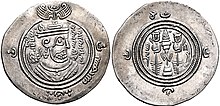
Back معاوية بن أبي سفيان Arabic ܡܥܘܝܐ ARC معاوية بن ابى سفيان ARZ Muawiya ibn Abi Sufyán AST I Muaviyə Azerbaijani معاویه AZB Мүәвиә ибн Әбү Суфыян Bashkir Муавия I (халиф) Bulgarian প্রথম মুয়াবিয়া Bengali/Bangla Muavija ibn Ebu-Sufjan BS
| Mu'awiya Iمعاوية | |||||
|---|---|---|---|---|---|
 | |||||
| 1st Caliph of the Umayyad Caliphate | |||||
| Reign | January 661 – April 680 | ||||
| Predecessor |
| ||||
| Successor | Yazid I | ||||
| Governor of Syria | |||||
| In Office | 639–661 | ||||
| Predecessor | Yazid ibn Abi Sufyan | ||||
| Successor | Post discontinued | ||||
| Born | c. 597–605 Mecca, Hejaz, Arabia | ||||
| Died | April 680 (aged c. 75–83) Damascus, Umayyad Caliphate | ||||
| Burial | Bab al-Saghir, Damascus | ||||
| Spouse |
| ||||
| Issue |
| ||||
| |||||
| House | Sufyanid | ||||
| Dynasty | Umayyad | ||||
| Father | Abu Sufyan ibn Harb | ||||
| Mother | Hind bint Utba | ||||
| Religion | Islam | ||||
Mu'awiya I (Arabic: معاوية بن أبي سفيان, romanized: Muʿāwiya ibn Abī Sufyān; c. 597, 603 or 605–April 680) was the founder and first caliph of the Umayyad Caliphate, ruling from 661 until his death. He became caliph less than thirty years after the death of the Islamic prophet Muhammad and immediately after the four Rashidun ('rightly-guided') caliphs. Unlike his predecessors, who had been close, early companions of Muhammad, Mu'awiya was a relatively late follower of Muhammad.
Mu'awiya and his father Abu Sufyan had opposed Muhammad, their distant Qurayshite kinsman and later Mu'awiya's brother-in-law, until Muhammad captured Mecca in 630. Afterward, Mu'awiya became one of Muhammad's scribes. He was appointed by Caliph Abu Bakr (r. 632–634) as a deputy commander in the conquest of Syria. He moved up the ranks through Umar's caliphate (r. 634–644) until becoming governor of Syria during the reign of his Umayyad kinsman, Caliph Uthman (r. 644–656). He allied with the province's powerful Banu Kalb tribe, developed the defenses of its coastal cities, and directed the war effort against the Byzantine Empire, including the first Muslim naval campaigns. In response to Uthman's assassination in 656, Mu'awiya took up the cause of avenging the murdered caliph and opposed the election of Ali. During the First Muslim Civil War, the two led their armies to a stalemate at the Battle of Siffin in 657, prompting an abortive series of arbitration talks to settle the dispute. Afterward, Mu'awiya gained recognition as caliph by his Syrian supporters and his ally Amr ibn al-As, who conquered Egypt from Ali's governor in 658. Following the assassination of Ali in 661, Mu'awiya compelled Ali's son and successor Hasan to abdicate and Mu'awiya's suzerainty was acknowledged throughout the Caliphate.
Domestically, Mu'awiya relied on loyalist Syrian Arab tribes and Syria's Christian-dominated bureaucracy. He is credited with establishing government departments responsible for the postal route, correspondence, and chancellery. He was the first caliph whose name appeared on coins, inscriptions, or documents of the nascent Islamic empire. Externally, he engaged his troops in almost yearly land and sea raids against the Byzantines, including a failed siege of Constantinople. In Iraq and the eastern provinces, he delegated authority to the powerful governors al-Mughira and Ziyad ibn Abi Sufyan, the latter of whom he controversially adopted as his brother. Under Mu'awiya's direction, the Muslim conquest of Ifriqiya (central North Africa) was launched by the commander Uqba ibn Nafi in 670, while the conquests in Khurasan and Sijistan on the eastern frontier were resumed.
Although Mu'awiya confined the influence of his Umayyad clan to the governorship of Medina, he nominated his own son, Yazid I, as his successor. It was an unprecedented move in Islamic politics and opposition to it by prominent Muslim leaders, including Ali's son Husayn, and Abd Allah ibn al-Zubayr, persisted after Mu'awiya's death, culminating with the outbreak of the Second Muslim Civil War. While there is considerable admiration for Mu'awiya in the contemporary sources, he has been criticized for lacking the justice and piety of the Rashidun and transforming the office of the caliphate into a kingship. Besides these criticisms, Sunni Muslim tradition honors him as a companion of Muhammad and a scribe of Qur'anic revelation. In Shia Islam, Mu'awiya is reviled for opposing Ali, accused of poisoning his son Hasan, and held to have accepted Islam without conviction.